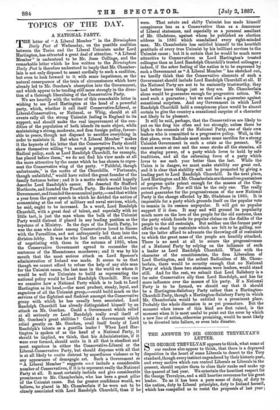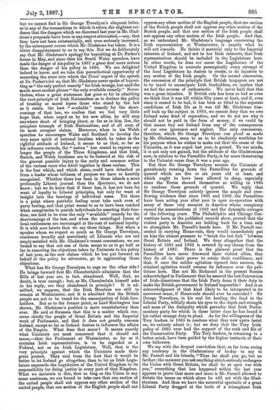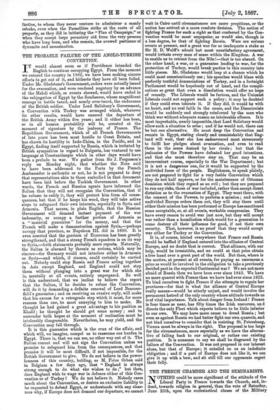THE ANSWER TO SIR GEORGE TREVELYAN'S LETTER.
SIR GEORGE TREVELYAN appears to think, what some of our readers also appear to think, that there is a depraved disposition in the heart of some Liberals to desert to the Tory standard, though every instinct engendered by their historic past, and every motive which can control Liberals as Liberals in the present, should require them to close their ranks and make up the quarrel of last year. We entertain the heartiest respect for Sir George Trevelyan, and a still heartier reverence for his great leader. To us it has been a pure sense of duty, of duty to the nation, duty to Liberal principles, duty to Ireland herself, which has compelled us to resist the proposals of last year ; but we cannot find in Sir George Trevelyan's eloquent letter, or in any of the transactions to which it refers, the slightest evi- dence that the dangers which we discerned last year in Mr. Glad- stone's proposals have been in anyrespect attenuated,—nay, that they have not been substantially, and even seriously increased, by the subsequent course which Mr. Gladstone has taken. It is a bitter disappointment to us to say this. But we do deliberately say that Mr. Gladstone's apology for boycotting at Dr. Parker's house in May, and since then his South Wales speeches, have made the danger of his policy in 1887 a great deal more serious than the danger of his policy in 1886. We are delighted indeed to know, and we take this parenthetical opportunity of correcting the error into which the Times' report of the speech at Dr. Parker's led us, that Mr. Gladstone never spoke of boycot- ting as " the only perfect remedy" for Irish wrongs, but used the much more modest phrase " the only available remedy." Never- theless, when a great statesman has gone so far in admitting the root-principle of Irish Nationalism as to declare the policy of treating as moral lepers those who stand by the law as it exists, the beet " available " remedy for the short- comings of that law, we confess that we feel very little hope that, when urged on by his new allies, he will stop anywhere short of bringing about, so far as in him lies, the complete triumph of Irish Nationalism, and of all even of its most arrogant claims. Moreover, when in his Welsh speeches he encourages Wales and Scotland to develop the very same spirit of national localism which he takes as the rightful attitude of Ireland, it seems to us that, so far as his influence extends, the " nation " has ceased to express any longer the people of the Three Kingdoms, and that Irish, Scotch, and Welsh localisms are to be fostered at the risk of the gravest possible injury to the unity and common action of the various races who dwell together in these realms. This is the fear which, and which alone, could have detached us from a leader whose loftiness of purpose we have so heartily recognised. Whether there has been in these islands a more profoundly Liberal journal than the Spectator, we do not know; but we do know that if there has, it has not been for want of loyalty to Liberal principles, but only for want of insight into the bearings of individual cases. Yet there is a point where patriotic feeling must take rank even of party feeling, and that point seems to us to have been reached when conspiracies to punish individuals for asserting their free- dom, are held to be even the only "available" remedy for the shortcomings of the law, and when the centrifugal forces of local restlessness are encouraged at the cost of national loyalty. It is with sore hearts that we say these things. But when a speaker whom we respect so much as Sir George Trevelyan, condemns broadly and mercilessly all Liberals who are not amply satisfied with Mr. Gladstone's recent concessions, we are bound to say that not one of them seems to us to go half as far in removing the objections taken by Unionists to his policy of last year, as the new claims which he has put forward on behalf of the policy he advocates, go in aggravating those objections. What has Sir George Trevelyan to urge on the other side ? He brings forward first Mr. Chamberlain's admission that the Bills of last year are, in fact, abandoned. Well, that, no doubt, is true enough ; but, as Mr. Chamberlain himself asks in his reply, are they abandoned in principle? It is ad- mitted, we suppose, that the Irish Members are still to remain at Westminster, and it is admitted that the British people are not to be taxed for the emancipation of Irish free- holders. But as to the former point, as Lord Hartington has shown, Mr. Gladstone's position is more unsatisfactory than ever. He said at Swansea that this is a matter which con- cerns chiefly the people of Great Britain and the Imperial work of Parliament, and that it does not greatly concern Ireland, except so far as Ireland desires to influence the affairs of the Empire. What does that mean ? It means exactly what Unionists are most concerned that it should not
mean,—that the Parliament at Westminster, so far as it contains Irish representatives, is to be regarded as a Federal, not as an Irish Legislature. Well, that is the very principle against which the Unionists made their great protest. They said from the first that it would be better to let Ireland go altogether, than to let an Irish Legis- lature supersede the Legislature of the United Kingdom in its responsibility for doing justice in every part of that Kingdom. What we maintain is this, that so long as the Union in any sense continues, we are bound to take care that one section of the united people shall not oppress any other section of the united people, that one section of the English people shall not
oppress any other section of the English people, that one section of the Scotch people shall not oppress any other section of the Scotch people, and that one section of the Irish people shall not oppress any other section of the Irish people. And that, as we understand Mr. Gladstone's language concerning the Irish representation at Westminster, is exactly what he will not concede. He thinks it material only to the Imperial interests of Ireland, and not to her Irish interests, that Irish representatives should be included in the Legislature here. In other words, he does not mean the Legislature of the United Kingdom to overrule peremptorily every attempt of the local Legislature he desires to create, to do injustice to any section of the Irish people. On the second concession, the concession of the principle that British taxpayers are not to be taxed to emancipate Irish freeholders, we confess that we feel the reverse of enthusiastic. We never held that this was a gross injustice. If British rule has been so bad as even we think that it was till within fifty years at least, and if, even since it ceased to be bad, it has been so blind to the separate conditions of Irish life as it was till Mr. Gladstone him- self took up the subject in 1869, we cannot deny that we owe Ireland some kind of reparation, and we do not see why it should not be paid in the form of money, if we could by that means buy out Ireland from any of the consequences of our own ignorance and neglect. The only concessions, therefore, which Sir George Trevelyan can plead as made by Mr. Gladstone, seem to as to be absolutely worthless for his purpose when he wishes to make out that the cause of the Unionists, as it was urged last year, is gained. To our minds, it is not only not gained, but the attitude of the Gladstonians now, in relation to the Parnellite Party, is far more threatening to the Unionist cause than it was a year ago.
But then Sir George Trevelyan accuses the Unionists of gratuitously running down the Parnellites for grounds of quarrel which are five or six years old at least, and which ought to have been allowed to sleep, especially since the Tories showed themselves so willing in 1885 to condone those grounds of quarrel. We reply that Sir George Trevelyan entirely ignores the ample and over- flowing evidence that since 1881 and 1882, the Parnellites have been acting year after year in open co-operation with many of those very enemies in America whose conspiracy caused the assassinations of 1882 and the dynamite outrages of the following years. The Philadelphia and Chicago Con- ventions have, as the published records show, proved that the violent party in America are holding back for a time only to strengthen Mr. Parnell's hands here. If Mr. Parnell suc- ceeded in carrying Home-rule, they would immediately put on him the utmost pressure to " break the last.link " between Great Britain and Ireland. We deny altogether that the history of 1881 and 1882 is severed by any chasm from the history of 1887. There is the plainest proof that the Parnellites have never disowned their violent allies, that they do all in their power to retain their confidence, and that, if once the milder agitation ripened into success, the criminal agitation would resume its influence over the poli- ticians here. Has not Mr. Redmond in the present Session acknowledged in Parliament that he assured the last Convention of Irish-Americans that the Irish Party deem it their duty to make the British government in Ireland impossible ? And is an acknowledgment of that kind likely to be interpreted in its narrowest sense, if Home-rule should ever be conceded I Sir George Trevelyan, in his zeal for healing the feud in the Liberal Party, wilfully shuts his eyes to the depth and strength and mass of the disloyalty which pervades that Irish Parlia- mentary party for which in these latter days he has found it
his rather strange duty to plead. As for the willingness of the Tory leaders in 1885 to condone what they now again insist
on, we entirely admit it; but we deny that the Tory Irish policy of 1885 ever had the support of the rank and file of the Conservative Party. The Tory leaders, in returning to a better mind, have been guided by the higher instincts of their own followers.
We say with the deepest conviction that, so far from seeing any tendency in the Gladstonians of to-day to say to Mr. Parnell and his friends, "Thus far shall you go, but no farther; the moment you ask anything which seriously endangers the Union with Great Britain, we shall be at open war with you," everything that has happened within the last year appears to prove that more and more is Mr. Parnell allowed to dictate the terms on which alone he will act with the Glad- stonians. And thus we have the sorrowful spectacle of a great Liberal Party dragged at the heels of a triumphant Irish fiction, to whom they never venture to administer a manly rebuke, even when the Parnellites strike at the roots of all property, as they did in initiating the "Plan of Campaign," or when they accept large pecuniary aid from the very persons who have long been, and who remain, the avowed partisans of dynamite and assassination.




































 Previous page
Previous page